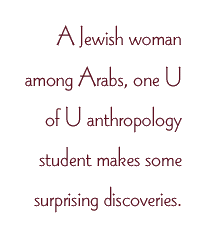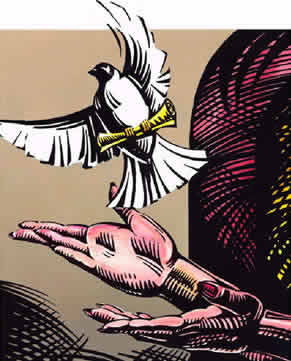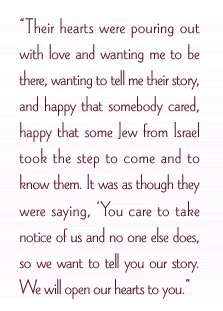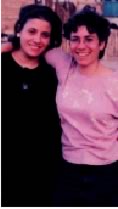|




Yally
Livnat (r.) with
Bairuni High School secretary
|
When one thinks of Israelis
and Arabs, images of conflict and violence spring to mind, images
borne of the gulf of misunderstanding and fear that divides the
two peoples. But one doctoral candidate at the University of Utah,
Yally Livnat, an Israeli Jewish woman, is making an effort to bridge
that gulf.
Livnat came to Salt Lake City from Israel in 1991 so her husband
could study computer science at the U. She, too, enrolled at the
University, deciding to pursue a doctorate in anthropology, a degree
she hoped would help her qualify for an administrative position
in one of several Israeli nonprofit organizations that promote democracy
and pluralism. She was especially interested in improving relations
between Jews and Israeli Arabs.
To Americans, the term “Israeli Arab” may seem an oxymoron.
We know about Arabs who live in the occupied territories, but aren’t
all Israelis Jewish? In fact, the population of Israel (not including
Israeli-occupied territories) is approximately 20 percent Arab,
and Arabs in Israel enjoy almost all rights of citizenship, including
voting, serving in the Israeli parliament, and attending public
schools.
Livnat decided to focus
her research on the attitudes of Arab teenagers, a group about whom
relatively little research had been conducted. In order to do this,
she determined to go back to Israel for a year to teach at an Arab
high school.
In December 1997, Livnat went to the Arab village of Jdeide-Makr
(pronounced Juhd-eye´-day Mah´-kur) in northern Israel
to apply for a one-year teaching job. She was interviewed by Hani
Musa, a teacher, and by Ahmed Darwish, the principal, a man Livnat
describes as a teacher, poet, intellectual figure, and political
leader among Israeli Arabs.
During the interview, Livnat explained her research plan to the
two men. Even though she did not have teaching certification, they
offered her a part-time position teaching English and math the following
school year. “Nobody knows our story,” Livnat remembers
Ahmed Darwish saying, “and if you can tell our story, even
a little, that will be very important.”
In September 1998, Livnat moved to Israel with her three young sons.
She rented an apartment on a kibbutz, not far from the Lebanese
border. There were nights when she huddled with her boys as Katyusha
rockets, fired by Hizbollah guerrillas in southern Lebanon, exploded
nearby. By day, she drove 20 minutes to her job at Bairuni High
School.
In Livnat’s view, the school is remarkable. Its students —
primarily from working-class families — are top scholastic
performers, and one year, she says, they received the highest average
marks on their matriculation exams of any high school in Israel.
She likens the accomplishment to “a high school in Harlem ranking
first in the nation on SAT scores” and attributes the students’
high academic performance to strong parental support and to the
professionalism and dedication of Hani Musa and his colleagues,
who volunteer many extra hours of teaching.
Livnat remembers her first class. “I walked into the classroom
and I was terrified, because in front of me are these 20 people
who I know hate me—which turns out not to be true,” she
says. “It took me a while to warm up and to feel confident,
as opposed to being terrified of my students because ‘Arabs
hate Jews.’ At least, that’s what the rhetoric in Israel
is.”
With time, Livnat relaxed as she came to feel comfortable and accepted
by her students and colleagues. Perhaps it was her naturally warm
and outgoing personality that won them over. Perhaps it was her
genuine interest and curiosity about them and their culture, as
demonstrated by her research.
Initially, Livnat’s research objective was to investigate whether
Arabs in Israel use time — in the form of holidays and other
special events — to create a sense of national identity since
they were not permitted to use other symbols of nationalism, such
as the Palestinian flag or anthem. It was an interesting topic,
but she threw it out the window the day she walked into a classroom
and noticed that two-thirds of the students were female.
When she asked, half-jokingly, where the boys were, the girls answered
that the boys had dropped back to an easier class. “Why didn’t
you?” she asked them.
“Because
if we don’t have honorable jobs, we won’t be able to work
at all,” they answered. “For us to get out of the house,
to get out into the world, we must have honorable jobs.”

Livnat was amazed to see how hard the Arab girls worked at school,
and decided to refocus her research on the attitudes of these girls,
examining their use of academic achievement to enhance their possibilities
for personal freedom later in life. She developed research questionnaires,
which she administered to the male and female students at the school.
She also distributed the questionnaires in an urban Arab school,
a Bedouin school in southern Israel, and a Jewish school. In addition,
she conducted extensive interviews with her students and their families.
As a result of her research,
Livnat concludes that “the lives of the [young] women [of the
village]…are very much constrained by traditional Middle Eastern
values” and that many of them want “to enhance their personal
freedom, while not alienating themselves from their own society.”
Academic success provides a pathway to personal freedom in two ways.
First, education opens the doors to professional careers. Second,
education makes the women more attractive to educated men, who are
more likely than their non-educated counterparts to have been exposed
to Western culture and, therefore, more likely to allow their wives
increased personal freedom.
In the view of Laurence Loeb, professor of anthropology and chair
of Livnat’s dissertation supervisory committee, her findings
have “enabled her — and those of us who know her research
— to begin to entertain some new ideas and some new thinking
about what makes education successful in a society in which [education
has] not traditionally been a primary value, especially for women.”
One surprising and delightful result of Livnat’s research was
that her Arab acquaintances grew into friendships. She came to feel
comfortable dropping by the homes of her students and visiting for
hours, often staying for dinner. She spent so much time at the home
of Hani Musa and his wife that she almost became a second family
member.
When it came to male-female relationships, Livnat found she had
to make accommodations, including wearing modest dress. “I
conformed in many ways. I very seldom initiated conversations with
men, and when I spoke with them, it was in the way you’re supposed
to speak to men. You don’t look them in the eyes as much, you
back down if they argue with you, things like that.”
Livnat sees positive value in this delineation between male and
female roles in Arab society. “It’s not entirely bad.
The flip side of it is that [the man] will have to take care of
his wife and his children until the end of his days. So he has both
the authority and the responsibility that comes with being a man.”
Livnat also gained insights into what it is like to be an Arab in
Israel. She tells a story she heard from a 16-year-old Arab boy
who was the top student in a karate class. One day, the teacher
could not be at class and asked the boy to teach in his place. Thereupon,
the mother of one of the students told the young man, “I will
not let a Moslem teach my child,” and walked away with her
child. Evidently, not every parent felt this way because the young
man was able to teach the class.
As Ahmed Darwish, the principal, told her, “We are loyal to
Palestine just like the Jews of America are loyal to Israel. We
love Palestine, we want Palestine to exist, we’re going to
support Palestine in any way we can, but we don’t want to live
there. We are loyal Israeli citizens.”
It is her desire to work for the betterment of Israel that has motivated
Livnat’s work with Arabs in Israel. “I want to better
my society,” she says, “and through education, I can work
toward social justice for everyone.”
Livnat says she has seen people change as a result of her work.
She reports that an Israeli friend told her, “Listening to
you talk every day about your daily life with the Arabs has made
an immense difference in the way I view them. It has given me more
trust—I don’t see them as bad and foreign any more.”
Loeb, too, sees the value of conveying the “human dimension”
of the Arab-Israeli situation, and feels Livnat’s research
“shows that the people of Jdeide are just like people elsewhere,
with the same kinds of worries, concerns, and problems—and
they are not particularly hostile or angry, but basically want to
get on with their lives and to feel more accepted.”
It may seem to an observer
that the type of grass-roots effort Livnat has engaged in—multiplied
a thousand-fold—could eventually help bring about peace in
the Middle East. But she doesn’t see it that way. “Peace
is a political issue,” she says, “to be solved on the
political level by prime ministers—not a personal issue.”
Even so, her efforts may be bearing fruit on a small scale. Livnat
remembers a scene that occurred one day as she drove out of the
village. Half a dozen people waved to her, calling out her name.
“Everybody
accepted me,” she recalls. “Their hearts were pouring
out with love and wanting me to be there, wanting to tell me their
story, and happy that somebody cared, happy that some Jew from Israel
took the step to come and to know them. It was as though they were
saying, ‘You care to take notice of us and no one else does,
so we want to tell you our story. We will open our hearts to you.’”
—Mike Arnow MA’79 is a freelance writer and independent
video producer in Salt Lake City.

|






